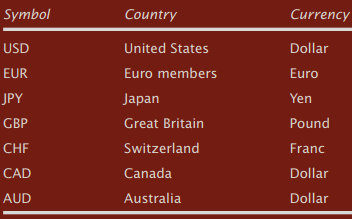What is Forex ?
Foreign exchange is the simultaneous buying of one currency and selling of another. Currencies are traded through a broker or dealer and are executed in currency pairs; for example, the Euro Dollar and the US Dollar (EUR/USD) or the British Pound and the Japanese Yen (GBP/JPY). The Foreign Exchange Market (FOREX) is the largest financial market in the world, with a volume of over $2 trillion daily. This is more than three times the total amount of the stocks and futures markets combined. Unlike other financial markets, the FOREX spot market has neither a physical location nor a central exchange. It operates through an electronic network of banks, corporations, and individuals trading one currency for another. The lack of a physical exchange enables the FOREX market to operate on a 24- hour basis, spanning from one time zone to another across the major financial centers. This fact—that there is no centralized exchange—is important to keep in mind as it permeates all aspects of the FOREX experience
What Is a Spot Market?
A spot market is any market that deals in the current price of a financial instrument. Futures markets, such as the Chicago Board of Trade, offer commodity contracts whose delivery date may span several months into the futures. Settlement of FOREX spot transactions usually occurs within two business days. There are also futures and forwards in FOREX, but the overwhelming majority of traders use the spot market. I will discuss the opportunities to trade FOREX futures on the International Monetary Market.
Which Currencies Are Traded?
Any currency backed by an existing nation can be traded at the larger brokers. The trading volume of the major currencies (along with their symbols) is given in descending order: the U.S. Dollar (USD), the Euro Dollar (EUR), the Japanese Yen (JPY), the British Pound Sterling (GBP), the Swiss Franc (CHF), the Canadian Dollar (CAD), and the Australian Dollar (AUD). See Table. All other currencies are referred to as minors. FOREX currency symbols are always three letters, where the first two letters identify the name of the country and the third letter identifies the name of that country’s currency. (The “CH” in the Swiss Franc acronym stands for Confederation Helvetica.)

How Are Currency Prices Determined?
Currency prices are affected by a very large matrix of constantly changing economic and political conditions, but probably the most important are interest rates, international trade, inflation, and political stability. Sometimes governments actually participate in the foreign exchange market to influence the value of their currencies. They do this either by flooding the market with their domestic currency in an attempt to lower the price or, conversely, buying in order to raise the price. This is known as central bank intervention. Any of these factors, as well as large market orders, can cause high volatility in currency prices. However, the size and volume of the FOREX market make it impossible for any one entity to drive the market for any length of time

COMMENTS
Login or Register to post comments.